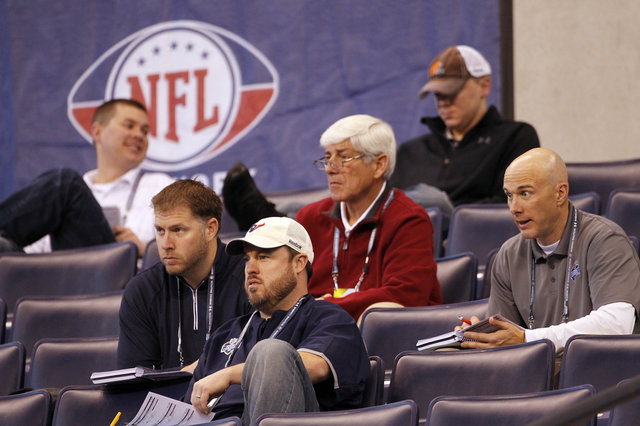 The NFL and NCAA are two separate entities when it comes to football in America. The NFL realizes the value of having an elite “minor league” system that doesn’t cost anything for NFL teams, while the NCAA realizes it has the value of saying “wait 3 or 4 years” before you get paid to these unpaid workers.
The NFL and NCAA are two separate entities when it comes to football in America. The NFL realizes the value of having an elite “minor league” system that doesn’t cost anything for NFL teams, while the NCAA realizes it has the value of saying “wait 3 or 4 years” before you get paid to these unpaid workers.
But in the wake of the Aaron Hernandez pending murder trial and the NFL once again under the national spotlight for the wrong reasons, Rodger Goodell leaked an idea where the NFL and NCAA will have an unique union that impacts the NFL Draft process. Bruce Feldman of CBS Sports reported that the NFL is considering banning prospects from the NFL Combine if they are academically ineligible.
And while the massive public outcry of negative support towards this idea has been made clear throughout the twitter-sphere, it’s an idea that isn’t completely ridiculous. Though it may not be the right way to go about it and mainly used as a PR move, the NFL needs to put a premium on high character. And this may be the first sign that they are serious about doing so.
First off, let’s make it known that pity should not be had for many of these prospects as they approach the NFL Combine. Many of these college seniors and juniors are not taking substantially difficult classes, as their intention isn’t entirely to graduate as it is to make the NFL. With the resources that Division I players have in terms of tutors, free books, designated study times, and more. Not passing classes as the college level isn’t a testament necessarily of a lack of intelligence (rarely), but a lack of drive, motivation, and maturity.
As Feldman points out in his article, a “sizeable group of players would not have been invited” to Indianapolis last year if this rule had been in place. If those players had not been invited, it would have brought too much traffic to lesser Pro Days, a less-sleek format for NFL teams to interview these top prospects, and actually less worth-while answers to the questions about maturity (and academics) team’s hope to get at the NFL Combine.
The NFL Combine is more about meeting, interacting, and poking at these players than how they do in compression shirts and shorts. The NFL Combine isn’t the resume submitting time of the job cycle like those who watch on TV think it is. It’s the interview process. Teams have these prospects’ resumes and have studied them. They are looking to learn about the player themselves, how they interact with pressure around them, if they can handle the profession, and if the team wants to deal with them on a daily basis. Just like the Wonderlic test isn’t the end all, be all for judging players’ intelligence, neither should a GPA, especially if it excludes a player from explaining themselves.
The NFL’s reasoning for potentially using academic standing as a reason to not be invited to Indianapolis isn’t the best of ideas, but their heart may be in the right place. Teaching these young players to be “pros” isn’t an easy task. By the time some of these players hit their junior year, they are already corrupted by money and power to a point that the NFL is unlikely to fix. Some of that comes from a poor NCAA system. But some of that can be corrected by forcing players to take college a bit more seriously.
As I said earlier, academics in college for these Division 1 NFL hopefuls is less about book smarts and high IQ and more about focus, motivation, and maturity. It’s a key question evaluators will ask about when they meet with these prospects because poor IQ and GPA scores can generally reflect poor maturity understanding.
The NFL can’t go into the NCAA and fix their problems with student-athletes, but restricting prospects access to major NFL “interview events” may be one of the few ways that NFL teams can force student-athletes to “grow up” in some way. The NFL doesn’t have an “arrest problem”, despite what some in the media belief, but it certainly can do more for their young players.
The NFL shouldn’t ban prospects from the NFL Combine for their academic standing for the 2014 NFL Draft. But in the future, as long as the players entering college knew what was expected, I wouldn’t be opposed to it in the next 2-3 years.
The NFL needs to constantly be ahead of the curve. The NFL has already enacted punishments to teams with multiple off-the-field offenders. The next step is to nip maturity issues in the bud before these potential future offenders get their NFL contracts. I applaud the NFL for considering a drastic step, but the timing isn’t right. But this may be a wake-up call for all 2013-2014 seniors and juniors and those in the future to take college seriously. And that certainly isn’t a negative for the football community.
Add The Sports Daily to your Google News Feed!